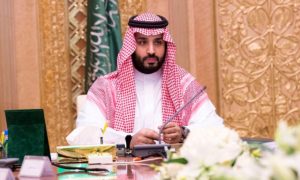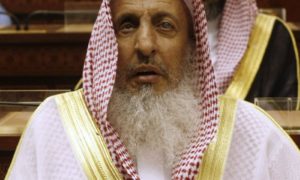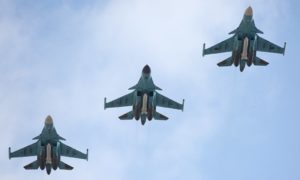Foreign leaders visiting King Salman of Saudi Arabia have noticed that there is a large flower display positioned just in front of where the 80-year-old monarch sits. On closer investigation, the visitors realised that the purpose of the flowers is to conceal a computer which acts as a teleprompter, enabling the King to appear capable of carrying on a coherent conversation about important issues. US delegation told afterwards this to President Obama, and they agreed that there was someone in the next room who wrote on the television screen and gave direct orders to King Salman.
One visiting US delegation meeting with King Salman recently observed a different method of convincing visitors – or at least television viewers watching the encounter – that he can deal with the escalating crises facing Saudi Arabia. The king did not look at the group but at a giant television screen hanging from the ceiling of the room on which was appearing prompts. Simon Henderson, the Saudi expert at the Washington Institute for Near East Policy, who tells the story, writes that off to one side in the room was an aide who “furiously hammered talking points into a keyboard”.
9/11 attacks
There is renewed pressure for the release of the unpublished 28 pages in the official Congressional 9/11 report on possible Saudi official complicity in the attacks, with CBS’s influential and widely watched 60 Minutes devoting a segment to it, thereby putting it back on the political agenda. “Saudi Arabia legitimises Islamic extremism and intolerance around the world,” states an op-ed by Nicholas Kristof in The New York Times. “”If you want to stop bombings in Brussels or San Bernardino, then turn off the spigots of incitement from Saudi Arabia and other Gulf countries.” Not only is there a growing anti-Saudi mood in the US, but it is one of the few political developments common to both parties.
In reality, the missing 28 pages in the 9/11 report on possible high level Saudi involvement may not be as categorical or as damaging to the Kingdom as the fact of their continued non-publication. The secrets that Saudi Arabia has most interest in hiding may be rather different, and relate to allegations that between 1995 and 2001, two senior Saudi princes spent hundreds of millions of state funds paying off Osama bin Laden not to make attacks within Saudi Arabia, but leaving him free to do whatever he wanted in the rest of the world.
Fifteen of the 19 hijackers were Saudi nationals, although no US investigation to date has reported finding evidence of Saudi government support for the 9/11 attacks.
HUMAN RIGHTS
Saudi Arabia has long been criticised for its harsh social codes and punishments, imposed under its puritanical version of Sharia law.
Beheading:
Ali Mohammed al-Nimr was arrested in February 2012 when he was just 17 and accused of organising protests. He was sentenced to death by beheading and crucifixion, along with his uncle, a leading Shia cleric. Philip Hammond, the Foreign Secretary, said last month he did not expect the sentence to be carried out. However, murderers, drug dealers and others convicted on purely criminal charges are often beheaded in public.
Womens’ rights:
While women did in 2105 get to register to vote and can stand for local elections, they are still required to have permission from a “guardian” such as a father, husband or brother to travel freely. Wearing modest clothes and a headscarf in public is compulsory. They are also banned from driving – subject of the country’s most visible civil disobedience campaign in recent years.
The regime in Saudi Arabia has been strongly criticized by human rights organizations.
Saudi Arabia has been compared to Daesh in long time now, especially for their support of terrorist organizations in Iraq, Syria and Yemen.
Hashtags #SueMeSaudi and #SaudiArabiaIsISIS has many hits every minute, and many want to mark their opposition and to show their distance to the brutal dictator regime in Saudi Arabia.
Saudi Arabia practice Wahhabism ideology, a strictly fundamentalist orientation within Sunni Islam, which in practice is the state religion in the country. It is also ideology direction that has inspired al-Qaida and DAESH.







